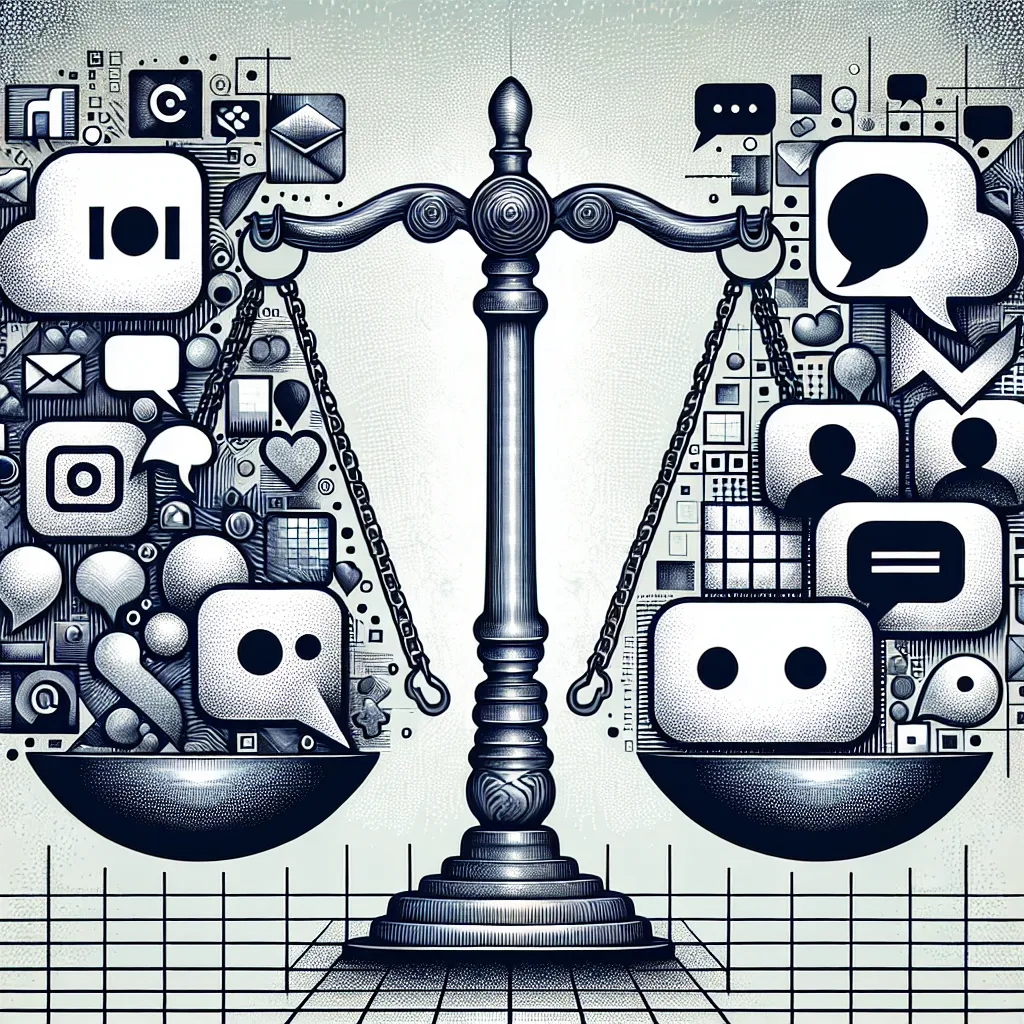Digital platforms and their impact on freedom of speech have become increasingly prevalent topics in recent IELTS Writing Task 2 exams. This trend reflects the growing importance of online communication in our daily lives and its influence on societal discourse. As an IELTS instructor, I’ve observed this theme appearing more frequently in the past year, and I expect it to continue being a popular subject in future tests.
Let’s examine a recent IELTS Writing Task 2 question that addresses this issue:
Some people believe that digital platforms have enhanced freedom of speech, while others argue that they have led to increased censorship and control of information. Discuss both views and give your own opinion.
Analyzing the Question
This question requires candidates to:
- Discuss how digital platforms have enhanced freedom of speech
- Explore how digital platforms have led to increased censorship and control of information
- Provide their own opinion on the matter
It’s crucial to address all parts of the question to achieve a high band score. Let’s look at two sample essays that tackle this topic – one aiming for a Band 8-9 and another for a Band 6-7.
Sample Essay 1 (Band 8-9)
The advent of digital platforms has sparked a heated debate regarding their impact on freedom of speech. While some argue that these platforms have democratized communication and expanded opportunities for expression, others contend that they have facilitated greater censorship and information control. In my opinion, while digital platforms have indeed broadened the scope for free speech, they have simultaneously created new challenges that require careful consideration.
Proponents of digital platforms argue that they have significantly enhanced freedom of speech. Social media networks, blogs, and online forums have provided unprecedented opportunities for individuals to voice their opinions, share ideas, and engage in public discourse. This democratization of communication has allowed marginalized voices to be heard and has facilitated the rapid spread of information, often circumventing traditional gatekeepers. For instance, during the Arab Spring, platforms like Twitter and Facebook played a crucial role in organizing protests and disseminating information that might otherwise have been suppressed by authoritarian regimes.
However, critics argue that digital platforms have also led to increased censorship and control of information. The centralization of online discourse on a handful of major platforms has given these companies significant power over what content is allowed and what is removed. This has raised concerns about arbitrary content moderation policies and the potential for these platforms to be influenced by political or commercial interests. Moreover, governments have exploited digital technologies to monitor citizens’ online activities, suppress dissent, and spread disinformation. The implementation of sophisticated surveillance systems and the use of automated content filtering algorithms have further exacerbated these issues.
In my view, while digital platforms have undoubtedly expanded opportunities for free speech, they have also introduced new complexities that require careful navigation. The benefits of increased access to information and the ability to reach global audiences must be balanced against the risks of misinformation, hate speech, and the potential for manipulation by powerful actors. Moving forward, it is essential to develop robust frameworks for platform governance that protect free speech while addressing legitimate concerns about harmful content and privacy.
In conclusion, the impact of digital platforms on freedom of speech is multifaceted and continues to evolve. While they have undeniably broadened the landscape for expression, they have also created new challenges that society must grapple with. Striking the right balance between fostering open dialogue and preventing the misuse of these platforms remains a critical task for policymakers, tech companies, and citizens alike.
(Word count: 398)
Sample Essay 2 (Band 6-7)
The rise of digital platforms has changed how we communicate and share information. Some people think these platforms have made it easier for people to express themselves freely, while others believe they have led to more censorship and control over information. In this essay, I will discuss both views and give my opinion.
On one hand, digital platforms have given people more chances to speak freely. Social media sites like Facebook and Twitter allow anyone with internet access to share their thoughts with a large audience. This has been especially important for people who might not have had a voice before, like minority groups or people living under strict governments. For example, during protests in many countries, people have used social media to organize and spread news quickly.
On the other hand, there are concerns that digital platforms have actually increased censorship and control of information. Big tech companies that own these platforms can decide what content to allow or remove, which some people see as a form of censorship. Also, governments can use these platforms to monitor what people are saying and even block access to certain information. In some countries, the government controls what people can see online, limiting their access to different viewpoints.
In my opinion, digital platforms have both positive and negative effects on freedom of speech. While they have made it easier for many people to express themselves, there are also new problems that need to be solved. I think it’s important to find a balance between allowing free speech and protecting people from harmful content online.
To conclude, digital platforms have changed how we think about freedom of speech. They have created new opportunities for expression but also new challenges. As these platforms continue to develop, we need to carefully consider how to use them in a way that supports free speech while also addressing concerns about censorship and control.
(Word count: 309)
 Digital platforms and freedom of speech
Digital platforms and freedom of speech
Key Points to Remember When Writing
-
Essay Structure: Both essays follow a clear structure with an introduction, body paragraphs discussing both views, the writer’s opinion, and a conclusion. The Band 8-9 essay demonstrates more sophisticated paragraph development and cohesion.
-
Vocabulary and Grammar:
- Band 8-9 essay uses more advanced vocabulary and complex sentence structures. For example: “The advent of digital platforms has sparked a heated debate…”
- Band 6-7 essay uses simpler language but still maintains clarity. For example: “The rise of digital platforms has changed how we communicate…”
-
Addressing the Task: Both essays discuss both views and provide a personal opinion, fulfilling the task requirements. The Band 8-9 essay offers more in-depth analysis and examples.
-
Coherence and Cohesion: The Band 8-9 essay demonstrates better use of cohesive devices and topic sentences, creating a more fluid argument.
-
Development of Ideas: The Band 8-9 essay provides more specific examples and deeper analysis, while the Band 6-7 essay offers more general statements.
Challenging Vocabulary to Remember
- Advent (noun) /ˈædvent/ – the arrival of a notable person, thing, or event
- Democratization (noun) /dɪˌmɒkrətaɪˈzeɪʃən/ – the action of making something accessible to everyone
- Circumventing (verb) /ˌsɜːkəmˈventɪŋ/ – finding a way around an obstacle
- Exacerbated (verb) /ɪɡˈzæsəbeɪtɪd/ – made worse
- Multifaceted (adjective) /ˌmʌltɪˈfæsɪtɪd/ – having many different aspects or features
- Grapple (verb) /ˈɡræpəl/ – engage in a close fight or struggle
- Arbitrary (adjective) /ˈɑːbɪtrəri/ – based on random choice or personal whim, rather than any reason or system
- Dissent (noun) /dɪˈsent/ – the expression or holding of opinions at variance with those commonly or officially held
In conclusion, the topic of digital platforms and their impact on freedom of speech is a complex and evolving issue that is likely to remain relevant in IELTS Writing Task 2. To prepare for this and similar topics, practice writing essays that discuss multiple perspectives and provide a balanced opinion. Consider exploring related themes such as the role of digital technologies in promoting human rights or the influence of social media on modern activism.
I encourage you to practice writing your own essay on this topic and share it in the comments section below. This active practice is an excellent way to improve your writing skills and prepare for the IELTS exam. Remember to analyze your own work critically, comparing it to the sample essays provided here, and don’t hesitate to ask for feedback from others.


